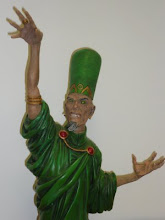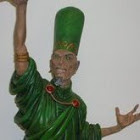 An anthology of stories by different writers, the art is all by Pete Woods.
An anthology of stories by different writers, the art is all by Pete Woods.What's Not To Like?, written by David Thomas. A man has a debt to the mob and a chance to pay it off. Very short, this is more of an idea than a fully formed story, it is written with care and enough compression to work. The story boils set up and conclusion to the smallest possible space and it does so without loosing anything vital. The stripped down story is all that is needed to capture the idea, it would not support any more weight that is does. The art is vital to selling the idea and it does so very nicely. It is the art that takes the burden of leading the reader and makes the story enjoyable to read again. The captures the nuance that the story needs to come to life and does not depend on surprise to achieve a result. The combination is slender and effective.
Valor & Mettle, written by Michael Consoli, letters by Bolt-01. Starship Captain Steinway has a problem, the new Western Minister of the Trans-Galactic Union is a dangerous menace who has threatened Steinway's family. A jump from his ship to Shenox's is his chance to deal directly with the problem. A classic set up that neatly develops an unexpected direction, this is smart storytelling. The shift in story gears is not jarring, the transition is nicely signalled by the corresponding change in art and the link between the two is strong, credible and affecting. The art reads better the second time around when the story intentions are known. Before this the art looks a little overblown, when the context is clearer the art become much more effective and the designs much more engaging. There is a subtlety to the art that the reader needs the full context to the story to see, this makes for a more interesting and satisfactory read.
Rouge Trooper: Sniper Alley, written by Tom Proudfoot. This is the most straightforward story in the collection, it is effective while lacking the impact of the other stories. Rouge Trooper is a modified super soldier in an never ending war, working alone with enhanced equipment. He encounters the victim of a sniper attack, the sniper would have to be extraordinary, even beyond Rouge Trooper himself to make the shot. Rouge makes a fateful choice and another choice is also made. The problem the story has is that to work the art has to reveal too much, the reader knows that a choice will have to be made and the likely result of the choice. Given these constraints, everyone works as hard as possible to make the story lift, the writing stages the situation as effectively as possible, the art supports it with care, the sum total is the best it could be, which is a lot better than it easily could have been.
Long Distance Call, written by David Thomas is the best written of the stories, a clever idea with the length to get into the details. A man receives a call from the future, the caller has a proposition to make. David Thomas solves a key problem, the proposition makes sense in both timelines and the validation of the the call is sharp. This is a character piece, no action beyond a phone call, the different locations are nicely set up, all the drama is in the interactions and reactions of the cast. They are very well drawn, the body language and facial expressions sell the situation and give it a solidity the idea needs.
The Last of the Camel Leopards, written by Karl Brandt does not quite work as a story, is has too little detail to come off with the force it needs. A good idea, camel leopards is nicely unexpected, it does not quite explain the conflict that is the context for the story. The art is great, the line work is clear and expressive and Ms Janet looks fierce, angry and scared all at the same time with a sword to her throat, a panel that delivers her personality in one go.
A very enjoyable selection, the art changes to match the requirements of the stories demonstrating Pete Wood's considerable technical skills and versatility.
Chief Wizard Note: This is a review copy very kindly sent by Pete Woods who is the artist and the publisher. To purchase a copy, and you should, contact plwoods@gmail.com. (P.L.Woods (Pete Woods) is a London based comic artist. His work has previously appeared in Zarjaz, Futurequake, Metaverse, and Food Chain. Food Chain (Planet Jimbot) written by Jim Alexander (2000AD, Marvel & DC) with lettering by Jim Campbell (Titan, Boom Studios, Zenescope) and illustrated by Pete Woods was on the long list for the British Comic Awards 2014 for the "Best Comic" category. He has also been nominated for "Emerging Talent" award at the 2014 British Comic Awards. http://plwoods.weebly.com/)
please contact




